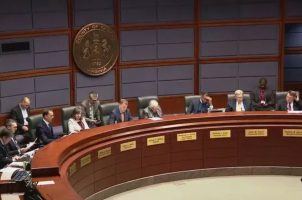Georgia Lottery Compliance Inspector Charged with Taking Kickbacks
Posted on: May 18, 2024, 03:02h.
Last updated on: May 18, 2024, 03:02h.
A Georgia Lottery compliance inspector was allegedly more interested that licensees complied with his bribery demands than state regulations, according to the Georgia Bureau of Investigation (GBI).

On Monday, GBI agents raided the home of Michael Jerome Kessler Sr. The lottery official has been charged with bribery, allegedly for accepting kickbacks from stores in Henry County, Ga. That’s in return for approving their operations during official lottery inspections.
Kessler encouraged at least three stores with coin-operated amusement machines (COAMs) to each pay him $2,000, according to the GBI.
What are COAMs?
Georgia is a conservative state when it comes to gambling. There are no commercial or tribal casinos. While it has horse racetracks, parimutuel betting is illegal.
But in 1991, the state legislature legalized “skill-based games” in convenience stores, gas stations, and truck stops. These are slot-like gaming machines, including video poker, whose prizes were limited to non-cash merchandise.
They’re defined as “Class B COAMs,” as opposed to “Class A COAMS,” which cover traditional amusement machines like claw-grabbers and pinball.
The Class B COAMs were essentially unregulated, which meant it was relatively easy for their hosts to stretch the rules by offering cash payouts.
In 2013, state lawmakers passed a bill that established a comprehensive framework of licensing and regulation for te machines. It placed the Georgia Lottery Commission (GLC) in charge of overseeing the terminals and ensuring licensees played by the rules.
However, illegal cash payouts are ubiquitous because venues that offer them are more popular with players, thereby increasing each machine’s profitability. That could create a situation where a corrupt regulatory official could make some money by turning a blind eye to cash payouts.
Integrity ‘a Bedrock’
State Senator Emanuel Jones sits on the Georgia Lottery Commission and lives in Henry County. He said in a statement this week that integrity was “the bedrock of the lottery, and its mission.”
“Essentially, people are making bets. They’re gambling when they’re using machines across the state or when they are betting on any other activities that we allow in Georgia, and we don’t want a criminal element to seep into that,” Jones said.
A lottery spokesperson said “employees are held to the highest standard to ensure that we achieve our important mission of maximizing revenues for HOPE and Pre-K.”
Under the 2013 law, the companies that distribute COAMs and the venues that host them get 45 percent each of the proceeds, leaving 10 percent for the state, which goes towards Georgia’s HOPE Scholarship and Pre-K programs.
Of the $3 billion gambled on Class B COAMs last year, $2.1 billion was returned to players. The state’s cut of the remaining $900 million was $90 million, which some lawmakers say is not enough.
Related News Articles
Arkansas Casinos to Link Progressive Slot Machines With Other States
Las Vegas Slots Have Become Stingier, But Not So You’d Notice
Florida Flop: Single-License Model Could Dampen Sports Betting Revenue
Slot Tax Threshold Increase Supported by IRS Advisory Council
Most Popular
This Pizza & Wings Costs $653 at Allegiant VIP Box in Vegas!
Sphere Threat Prompts Dolan to End Oak View Agreement
MGM Springfield Casino Evacuated Following Weekend Blaze
Atlantic City Casinos Experience Haunting October as Gaming Win Falls 8.5%
Most Commented
-
VEGAS MYTHS RE-BUSTED: Casinos Pump in Extra Oxygen
— November 15, 2024 — 4 Comments -
VEGAS MYTHS RE-BUSTED: The Final Resting Place of Whiskey Pete
— October 25, 2024 — 3 Comments -
Chukchansi Gold Casino Hit with Protests Against Disenrollment
— October 21, 2024 — 3 Comments
















No comments yet